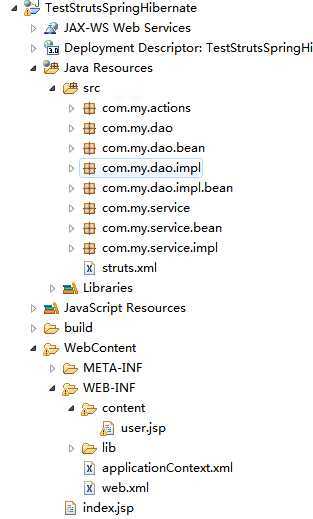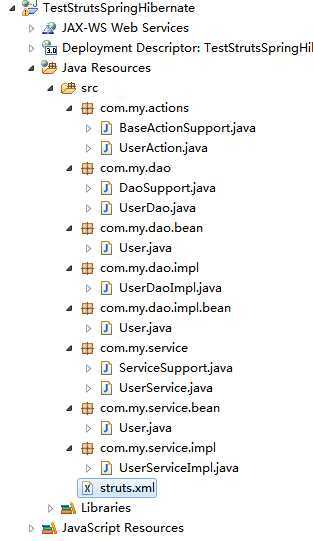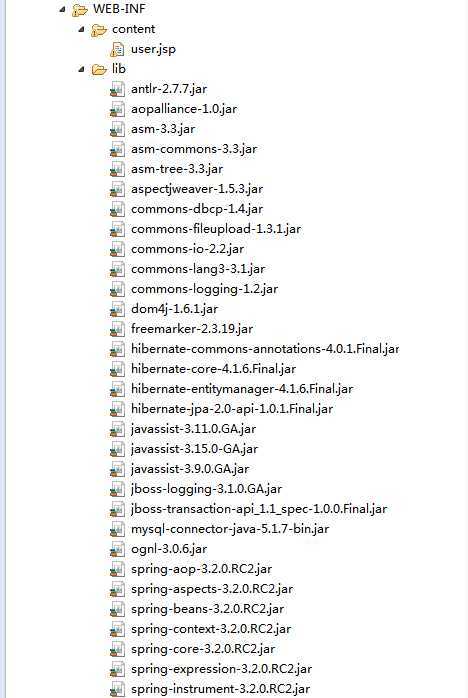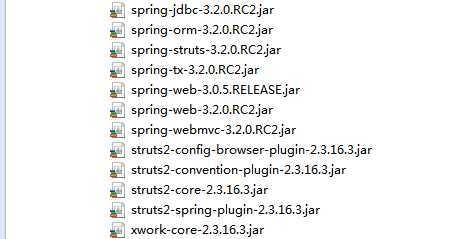标签:style blog http color io os 使用 java ar
Struts2 + Spring + Hibernate整合。
使用的是无配置方法进行SSH的整合,struts-convertion plugin + spring annotation + hibernate annotation方式,无配置快速开发。
示例
项目结构:

src源码结构:

WEB-INF\lib目录需要加入的jar包有:


1、将struts.xml加入到src目录当中:
<?xml version="1.0" encoding="UTF-8"?> <!DOCTYPE struts PUBLIC "-//Apache Software Foundation//DTD Struts Configuration 2.3//EN" "http://struts.apache.org/dtds/struts-2.3.dtd"> <struts> <!-- 使用Spring整合Struts --> <constant name="struts.objectFactory" value="spring" /> <!-- 把它设置为开发模式,发布时要设置为false --> <constant name="struts.devMode" value="true" /> <!-- 设置在class被修改时是否热加载,发布时要设置为false --> <constant name="struts.convention.classes.reload" value="true"/> <!-- 自动动态方法的调用,使用这个设置后可以这样调用:action!method --> <constant name="struts.enable.DynamicMethodInvocation" value="true" /> <!-- 指定jsp文件所在的目录地址 --> <constant name="struts.convention.result.path" value="/WEB-INF/content/" /> <!-- 使用struts-default默认的转换器,如果是rest的使用:rest-default,rest需要rest的jar插件 --> <constant name="struts.convention.default.parent.package" value="struts-default"/> <!-- 用于配置包名后缀。默认为action、actions、struts--> <constant name="struts.convention.package.locators" value="actions" /> <!-- 用于配置类名后缀,默认为Action,设置后,Struts2只会去找这种后缀名的类做映射 --> <constant name="struts.convention.action.suffix" value="Action"/> <!-- 设置即使没有@Action注释,依然创建Action映射。默认值是false。因为Convention-Plugin是约定优于配置的风格, 可以不通过注解根据预先的定义就能访问相应Action中的方法 --> <constant name="struts.convention.action.mapAllMatches" value="true"/> <!-- 自定义jsp文件命名的分隔符 --> <constant name="struts.convention.action.name.separator" value="-" /> <!-- 国际化资源文件名称 --> <constant name="struts.custom.i18n.resources" value="i18n" /> <!-- 是否自动加载国际化资源文件 --> <constant name="struts.i18n.reload" value="true" /> <!-- 浏览器是否缓存静态内容 --> <constant name="struts.serve.static.browserCache" value="false" /> <!-- 上传文件大小限制设置 --> <constant name="struts.multipart.maxSize" value="-1" /> <!-- 主题,将值设置为simple,即不使用UI模板。这将不会生成额外的html标签 --> <constant name="struts.ui.theme" value="simple" /> <!-- 编码格式 --> <constant name="struts.i18n.encoding" value="UTF-8" /> </struts>
使用SSH的struts.xml配置关键的一步是加入这一句:
<constant name="struts.objectFactory" value="spring" />
这里使用的是struts的convention插件,这样不需要手动写struts的配置。
2、在WEB-INF目录下新增一个xml:applicationContext.xml
<?xml version="1.0" encoding="UTF-8"?> <beans xmlns="http://www.springframework.org/schema/beans" xmlns:xsi="http://www.w3.org/2001/XMLSchema-instance" xmlns:context="http://www.springframework.org/schema/context" xmlns:aop="http://www.springframework.org/schema/aop" xmlns:tx="http://www.springframework.org/schema/tx" xsi:schemaLocation="http://www.springframework.org/schema/beans http://www.springframework.org/schema/beans/spring-beans-2.5.xsd http://www.springframework.org/schema/context http://www.springframework.org/schema/context/spring-context-2.5.xsd http://www.springframework.org/schema/aop http://www.springframework.org/schema/aop/spring-aop-2.5.xsd http://www.springframework.org/schema/tx http://www.springframework.org/schema/tx/spring-tx-2.5.xsd"> <bean id="dataSource" class="org.springframework.jdbc.datasource.DriverManagerDataSource"> <property name="driverClassName" value="com.mysql.jdbc.Driver" /> <property name="url" value="jdbc:mysql://127.0.0.1/test" /> <property name="username" value="root" /> <property name="password" value="root" /> </bean> <bean id="sessionFactory" class="org.springframework.orm.hibernate4.LocalSessionFactoryBean"> <property name="dataSource" ref="dataSource" /> <property name="packagesToScan"> <list> <value>com.my.dao.impl</value> </list> </property> <property name="hibernateProperties"> <value> hibernate.dialect=org.hibernate.dialect.MySQL5Dialect hibernate.hbm2ddl.auto=update hibernate.show_sql=true hibernate.format_sql=false hibernate.cache.use_second_level_cache=true hibernate.cache.use_query_cache=false hibernate.cache.provider_class=org.hibernate.cache.internal.NoCacheProvider hibernate.current_session_context_class= org.springframework.orm.hibernate4.SpringSessionContext </value> </property> </bean> <bean id="txManager" class="org.springframework.orm.hibernate4.HibernateTransactionManager"> <property name="sessionFactory" ref="sessionFactory" /> </bean> <context:component-scan base-package="com.my" /> <tx:annotation-driven transaction-manager="txManager" /> <tx:advice id="txAdvice" transaction-manager="txManager"> <tx:attributes> <tx:method name="*" read-only="true"/> <tx:method name="add*" propagation="REQUIRED" rollback-for="Exception"/> <tx:method name="create*" propagation="REQUIRED" rollback-for="Exception"/> <tx:method name="insert*" propagation="REQUIRED" rollback-for="Exception"/> <tx:method name="update*" propagation="REQUIRED" rollback-for="Exception"/> <tx:method name="delete*" propagation="REQUIRED" rollback-for="Exception"/> <tx:method name="remove*" propagation="REQUIRED" rollback-for="Exception"/> </tx:attributes> </tx:advice> <aop:config> <aop:pointcut id="allServiceMethods" expression="execution(* com.my.service.*.*(..))"/> <aop:advisor advice-ref="txAdvice" pointcut-ref="allServiceMethods"/> </aop:config> </beans>
这个spring的xml配置主要是设置spring与hibernate的关联。
3、web.xml设置
<?xml version="1.0" encoding="UTF-8"?> <web-app xmlns:xsi="http://www.w3.org/2001/XMLSchema-instance" xmlns="http://java.sun.com/xml/ns/javaee" xsi:schemaLocation="http://java.sun.com/xml/ns/javaee http://java.sun.com/xml/ns/javaee/web-app_3_0.xsd" id="WebApp_ID" version="3.0"> <display-name>TestStrutsSpringHibernate</display-name> <welcome-file-list> <welcome-file>index.jsp</welcome-file> </welcome-file-list> <!-- 使用ContextLoaderListener初始化Spring容器 --> <listener> <listener-class>org.springframework.web.context.ContextLoaderListener</listener-class> </listener> <!-- 定义Struts 2的FilterDispathcer的Filter --> <filter> <filter-name>struts2</filter-name> <filter-class>org.apache.struts2.dispatcher.ng.filter.StrutsPrepareAndExecuteFilter</filter-class> </filter> <!-- FilterDispatcher用来初始化Struts 2并且处理所有的WEB请求。 --> <filter-mapping> <filter-name>struts2</filter-name> <url-pattern>/*</url-pattern> <dispatcher>REQUEST</dispatcher> <dispatcher>FORWARD</dispatcher> <dispatcher>INCLUDE</dispatcher> <dispatcher>ERROR</dispatcher> </filter-mapping> </web-app>
在filter-mapping中有四个dispatcher,这是用于jsp的内容转发使用的。
4、/index.jsp
<%@ page language="java" contentType="text/html; charset=UTF-8" pageEncoding="UTF-8"%> <!DOCTYPE html PUBLIC "-//W3C//DTD HTML 4.01 Transitional//EN" "http://www.w3.org/TR/html4/loose.dtd"> <html> <head> <meta http-equiv="Content-Type" content="text/html; charset=UTF-8"> <title>Index</title> </head> <body> <jsp:forward page="user"></jsp:forward> </body> </html>
注意上面的<jsp:forward />,如果第3步中没有设置filter-mapping的<dispatcher>FORWARD</dispatcher>,那这里功能会失效抛异常。
5、源码
package:com.my.dao
下面有两个类:DaoSupport(抽象DAO主类)和UserDao(接口)
package com.my.dao; import javax.annotation.Resource; import org.hibernate.SessionFactory; import org.springframework.stereotype.Repository; @Repository public abstract class DaoSupport { @Resource private SessionFactory sessionFactory; public SessionFactory getSessionFactory() { return sessionFactory; } public void setSessionFactory(SessionFactory sessionFactory) { this.sessionFactory = sessionFactory; } }
package com.my.dao; import java.util.List; import com.my.dao.bean.User; public interface UserDao { /* * get all users */ public List<User> findUsers(); }
以及对应的DAO bean:
package com.my.dao.bean; public class User { public long id; public String name; public long getId() { return id; } public void setId(long id) { this.id = id; } public String getName() { return name; } public void setName(String name) { this.name = name; } }
UserDao接口的实现类:(实现接口和继承DAO主抽象类)
package com.my.dao.impl; import java.util.ArrayList; import java.util.List; import org.hibernate.Query; import org.hibernate.Session; import org.springframework.beans.BeanUtils; import org.springframework.stereotype.Repository; import com.my.dao.DaoSupport; import com.my.dao.UserDao; import com.my.dao.bean.User; @Repository(value = "userDao") public class UserDaoImpl extends DaoSupport implements UserDao { /* * get all users */ @SuppressWarnings("unchecked") public List<User> findUsers() { List<User> joUsers = new ArrayList<User>(); try { Session session = super.getSessionFactory().getCurrentSession(); Query query = session.createQuery("FROM User"); List<com.my.dao.impl.bean.User> poUsers = query.list(); for (com.my.dao.impl.bean.User user : poUsers) { User u = new User(); BeanUtils.copyProperties(user, u); joUsers.add(u); } } catch (Exception e) { e.printStackTrace(); } return joUsers; } }
DAO中对应数据库的persistent object:(hibernate的ORM映射关系对象)
package com.my.dao.impl.bean; import javax.persistence.Column; import javax.persistence.Entity; import javax.persistence.GeneratedValue; import javax.persistence.GenerationType; import javax.persistence.Id; import javax.persistence.Table; @Entity @Table(name="user") public class User { @Id @GeneratedValue(strategy=GenerationType.IDENTITY) public long id; @Column(name="name", length=200, nullable=false) public String name; public long getId() { return id; } public void setId(long id) { this.id = id; } public String getName() { return name; } public void setName(String name) { this.name = name; } }
pacakge:com.my.service
下面有两个类:ServiceSupport(抽象Service主类)和UserService(接口)
package com.my.service; public abstract class ServiceSupport { }
package com.my.service; import java.util.List; import com.my.service.bean.User; public interface UserService { /* * get all users */ public List<User> findUsers(); }
Service Bean(BO)
package com.my.service.bean; public class User { public long id; public String name; public long getId() { return id; } public void setId(long id) { this.id = id; } public String getName() { return name; } public void setName(String name) { this.name = name; } }
Service接口的实现类:UserServiceImpl,实现ServiceSupport抽象主类和UserService接口
package com.my.service.impl; import java.util.ArrayList; import java.util.List; import javax.annotation.Resource; import org.springframework.beans.BeanUtils; import org.springframework.stereotype.Service; import com.my.dao.UserDao; import com.my.service.ServiceSupport; import com.my.service.UserService; import com.my.service.bean.User; @Service(value="userService") public class UserServiceImpl extends ServiceSupport implements UserService { @Resource(name="userDao") private UserDao userDao; public UserDao getUserDao() { return userDao; } public void setUserDao(UserDao userDao) { this.userDao = userDao; } /* * get all users */ public List<User> findUsers(){ List<User> boUsers = new ArrayList<User>(); List<com.my.dao.bean.User> poUsers = userDao.findUsers(); for(com.my.dao.bean.User user : poUsers){ User u = new User(); BeanUtils.copyProperties(user, u); boUsers.add(u); } return boUsers; } }
package:com.my.actions
action的基类,继承说struts2的ActionSupport类:
package com.my.actions; import com.opensymphony.xwork2.ActionSupport; @SuppressWarnings("serial") public abstract class BaseActionSupport extends ActionSupport { }
UserAction,继承说BaseActionSupport基类:
package com.my.actions; import java.util.List; import javax.annotation.Resource; import org.apache.struts2.ServletActionContext; import org.springframework.stereotype.Controller; import com.my.service.UserService; import com.my.service.bean.User; @Controller @SuppressWarnings("serial") public class UserAction extends BaseActionSupport { @Resource(name="userService") private UserService userService; public UserService getUserService() { return userService; } public void setUserService(UserService userService) { this.userService = userService; } @Override public String execute() throws Exception { List<User> users = userService.findUsers(); ServletActionContext.getRequest().setAttribute("users", users); return SUCCESS; } }
6、加入action对应的jsp:
路径:WEB-INF\content\user.jsp
<%@ page language="java" contentType="text/html; charset=UTF-8" pageEncoding="UTF-8"%> <%@ taglib prefix="s" uri="/struts-tags" %> <!DOCTYPE html PUBLIC "-//W3C//DTD HTML 4.01 Transitional//EN" "http://www.w3.org/TR/html4/loose.dtd"> <html> <head> <meta http-equiv="Content-Type" content="text/html; charset=UTF-8"> <title>Insert title here</title> </head> <body> Total users: ${users.size()}<br/> <table cellpadding="1" border="1px"> <tr> <th>User id</th> <th>User name</th> </tr> <s:iterator id="users" value="#request.users"> <tr> <td><s:property value="id"/></td> <td><s:property value="name"/></td> </tr> </s:iterator> </table> </body> </html>
7、运行结果:

标签:style blog http color io os 使用 java ar
原文地址:http://www.cnblogs.com/HD/p/3972513.html